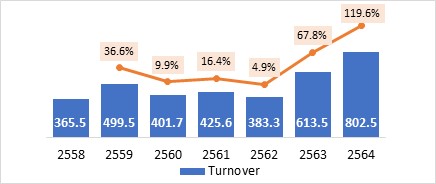Performance of ESG Stocks : Case of Stock Exchange of Thailand
Keywords:
ESG Stock, CAPM model, Fama-French-Three-Factor modelAbstract
ESG Stocks are stocks of the companies that operate for Sustainable Growth by putting into consideration the Environmental Factor (E), the Social Responsibility Factor (S) and the Corporate Governance Factor (G). Due to the higher interest in investing in ESG stocks, the objective of this paper is, therefore, set up in order to study the performance of ESG stocks by formatting ESG stocks into 2 groups. The portfolios are formed based on socially and environmentally sensitive industries: sensitive industry and non-sensitive industry and their performances are compared with the performances of Non-ESG stocks. Data are collected for a total of 120 months from January 2012 to December 2021 using Jensen’s Alpha as a proxy to measure the stock performance. According to the Fama-French-Three-Factor Model, positive Jensen’s Alphas are detected significantly for the ESG stocks, both in sensitive and non-sensitive industries while the Alpha of Non-ESG stocks is not significant. Result of this study confirms the hypothesis that the performance of ESG stocks, measured by Jensen’s Alpha is better than Non-ESG stocks. The result of this study will help investors in setting the strategy in selecting stocks for their portfolio, help stimulate the listed companies to operate by paying more attention to ESG issues and support Stock Exchange of Thailand to promote the listed companies in participating and answering the questionnaires to get selected and be included in the list of Thailand Sustainability Investment (THSI).
References
Akgun, O.T., Mudge, T.J. & Townsend, B. (2021). How company size bias in ESG scores impacts the small cap investor. The Journal of Impact and ESG Investing Summer, 1(4), 31-44. https://doi.org/10.3905/jesg.2021.1.022
Consolandi, C., Jaiswal-Dale, A., Poggiani, E., & Vercelli, A. (2009). Global standards and ethical stock indexes: The case of the Dow Jones Sustainability STOXX Index. Journal of Business Ethics 87 (Suppl 1), 185-197. https://doi.org/10.1007/s10551-008-9793-1
Cornell, B. 2021. ESG preferences, risk and return. European Financial Management, 27 (1), 12-19. https://doi.org/10.1111/eufm.12295
Cowen, S. S., Ferreri, L. B., & Parker, L. D. (1987). The impact of corporate characteristics on social responsibility disclosure: A typology and frequency-based analysis. Accounting, Organizations and Society, 12(2), 111-122. doi:https://doi.org/10.1016/0361-3682(87)90001-8 https://doi.org/10.1016/0361-3682(87)90001-8
Fama, E.F. & French, K.R. (1992). The cross-section of expected stock returns. The Journal of Finance, 47(2), 427-465. https://doi.org/10.1111/j.1540-6261.1992.tb04398.x
Garcia, A.S., Mendes-da-Silva, W., & Orsato, R.J. (2017). Sensitive industries produce better ESG performance: Evidence from emerging markets. Journal of Cleaner Production, 150, 135-147. https://doi.org/10.1016/j.jclepro.2017.02.180
Global Sustainable Investment Alliance. (2020). Global Sustainable Investment Review 2020. https:// http://www.gsi-alliance.org/wp-content/uploads/2021/08/GSIR-20201.pdf
Jensen, M.C. (1968). The performance of mutual funds in the period 1945-1964. The Journal of Finance, 23, 389-416. https://doi.org/10.1111/j.1540-6261.1968.tb00815.x
Khan, M. (2019). Corporate Governance, ESG, and Stock Returns Around the World. Financial Analysts Journal, 75(4), 1-19. https://doi.org/10.1080/0015198X.2019.1654299
Lintner, J. (1965) The Valuation of risk assets and the selection of risky investments in stock portfolios and capital budgets. Review of Economics and Statistics, 47, 13-37. https://doi.org/10.2307/1924119
Markowitz, H. (1952). Portfolio Selection. The Journal of Finance, 7, 77-91. https://doi.org/10.1111/j.1540-6261.1952.tb01525.x
Morningstar Thailand. (2021). กองทุนรวม ESG ในประเทศโตก้าวกระโดด. https://www.setinvestnow.com/th/knowledge/article/166-the-promising-growth-of-thai-esg-funds
Mossin, J. (1966). Equilibrium in a capital asset market. Econometrica, 34 (2), 768-783. https://doi.org/10.2307/1910098
Ok, Y., & Kim, J. (2019). Which corporate social responsibility performance affects the cost of equity? Evidence from Korea. Sustainability, 11(10), 2947. https://doi.org/10.3390/su11102947 https://doi.org/10.3390/su11102947
Pattarasen, W., & Wongsaravit, P. (2021). ESG Impact Assessment Report: THSI 2021. Stock Exchange of Thailand. https://www.setsustainability.com/download/578o3jwaecfidgz
Reverte, C. (2009). Determinants of corporate social responsibility disclosure ratings by Spanish listed firms. Journal of Business Ethics, 88, 351-366. https://doi.org/10.1007/s10551-008-9968-9
Sahut, J. M., 2014, ESG impact on market performance of firms: International evidence. Management International, 19(2), 1-30. DOI:10.7202/1030386ar https://doi.org/10.7202/1030386ar
Sassen, R., Hinze, A. K., & Hardeck, I., (2016). Impact of ESG factors on firm risk in Europe. Journal of Business Economics, 86(8), 867-904. https://doi.org/10.1007/s11573-016-0819-3
Sharpe, W.F. (1964) Capital asset prices: A theory of market equilibrium under conditions of risk. Journal of Finance, 19, 425-442. https://doi.org/10.1111/j.1540-6261.1964.tb02865.x
Stock Exchange of Thailand. (n.d.). Sustainable Capital Market Development. http://www.setsustainability.com/libraries/761/item/-upload-file-insert-link-
Stock Exchange of Thailand. (n.d.) ข้อมูลสถิติสำคัญของ SET และ MAI. https://www.set.or.th/th/market/statistics/market-statistics/main

Downloads
Published
How to Cite
Issue
Section
License
Copyright (c) 2022 NIDA Business School, National Institute of Development Administration

This work is licensed under a Creative Commons Attribution-NonCommercial-NoDerivatives 4.0 International License.



